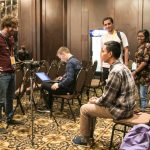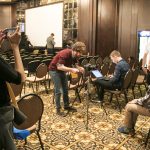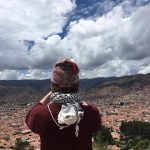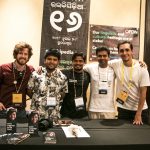Interview by Melissa Harkin, PLD Blog Co-Editor
Last week, we published a list of the PLD Speakers and Talks @ ATA59. The idea behind the post was to inform you about the PLD-related sessions at our upcoming conference. However, that’s not all: we want to help you to get to know the speakers as well.
Starting today, we are publishing an interview series with all of our PLD colleagues speaking at ATA 59, starting with Daniel Bögre Udell.
Welcome to the PLD blog, Daniel!
About the speaker
Daniel Bögre Udell is the co-founder of Wikitongues, a nonprofit platform for world languages. Between 2010 and 2015, he was an active contributor to the nonprofit news initiative Global Voices, cofounding the project’s Catalan language edition and translating Catalan articles into English. He has a BFA in design and technology and a master’s degree in historical studies from the New School University in New York City. In addition to his native English, he speaks Spanish, Catalan, and Portuguese.
(Language Technology Division Distinguished Speaker)
Promoting and Preserving Linguistic Diversity Online, Part I
Promoting and Preserving Linguistic Diversity Online, Part II
Interview
You are the cofounder of Wikitongues, a nonprofit platform for world language. Can you tell our readers a little bit about the platform?
Daniel: Wikitongues a nonprofit initiative to preserve cultural diversity by safeguarding every language in the world. We began as a grassroots effort to build an open archive of oral histories in all 7,000 languages. As our movement grew, we expanded our mission to include equipping language activists with the necessary frameworks to document and sustain their languages for future generations. We’re 100% volunteer driven, with contributors in dozens of countries around the world. Some, like Kristen Tcherneshoff, who will be delivering the keynote at UNESCO’s Changsa Gathering later this month, are trained linguists or linguists-in-training. Others, like Kunto Nurcahyoko in Borneo, are language educators. Others, like Àdhamh O Broin of the Dalriada Scottish community, are language activists, eager to promote their work toward linguistic preservation and revival. Language diversity is the great library of human experience. We believe everyone has a role to play in its defense.
You were an active contributor to the nonprofit news initiative Global Voices. Do you see translation as a tool of activism? If so, why?
Daniel: Translation is essential to activism because it builds empathy and expands access to other ideas, making it possible to create more awareness and change public opinion. It also makes it possible to shine a light on stories and movements that remain marginalized by mainstream and global discourse. When I was a contributor to Global Voices, we worked to do just that with regards to the shifting political tides in Spain. Today, the crisis in Catalonia is well known to anyone who follows European politics, but back in 2010, the growing tension was for the most part invisible to those who didn’t speak Catalan, both inside and outside Spain. One need look no further than the apparent surprise in Brussels and Madrid to last year’s declaration of independence. The day after the declaration, a Polish friend of mine called me. “I remember three years ago you said there would be an attempt to declare independence. I thought you were crazy, but you were right!”
Global Voices is an extraordinary initiative working to shine a light on overlooked stories from around the world. They do this in part by leveraging an internal translation network: contributors, who are mostly translators and journalists, write original content from their part of the world, which contributors in other regions translate. When I learned in 2010 that they were interested in launching a Catalan-language edition, I was thrilled to help get it off the ground. I had just returned from living in Barcelona and was grateful to continue to engage with the language. I was one of the Catalan edition’s first contributors, but the project really took once Violeta Camarasa, a journalist from Valencia, took the helm. We made great use of translation as a tool for activism, working to bring new stories to the Catalan-speaking world and Catalan stories to the rest of the world. We published stories originally written in Bengali, Mandarin, Malagasy, Macedonian, Arabic, and others. We also made a concerted effort to publish original content about the growing independence movement in Catalonia and the surrounding political and social context, in an attempt to bridge what we perceived to be gaps in international media coverage. These articles were translated into dozens of languages, like English, Mandarin, French, Spanish, Hungarian, and others. Eventually, we even compelled Al Jazeera to host a live-stream broadcast about the situation in Catalonia.
Your session will address the topic of linguistic diversity. What can attendees expect from your lecture?
Daniel: Attendees can expect a tour of the growing movement to sustain linguistic diversity. We’ll explore the historical conditions that precipitated current rates of endangered languages and survey the ecosystem of organizations and initiatives looking to stem the tide, including Wikitongues. We’ll take a tour of language activism today by getting to know Wikitongues volunteers and contributors from different countries. We’ll listen to them speak and learn about how they approach linguistic and cultural preservation in the twenty-first century. We’ll also explore the range of tools we use to organize remotely and at scale. I hope that attendees will leave with reason to hopeful about the future of linguistic diversity. They will also likely listen to certain languages for the first time!
In addition to your native English, you also speak Spanish, Catalan, and Portuguese. What made you want to learn Portuguese?
Daniel: Before I lived in Spain, I often performed poorly in language classes and come to believe the lie that so many monolingual adults are told: it was “too late” for me to learn new languages. (I firmly believe that this notion is one of the biggest roadblocks to language learning.) Spanish and Catalan opened the door to language for me and set up the foundation of my life. My multilingual journey began in Iberia, and so I have soft spot for all Iberian languages — I feel at home when I hear them spoken. In college, I made a lot of Brazilian friends, including Frederico Andrade, with whom I went on to cofound Wikitongues. My experience learning Catalan taught me that the best languages to learn are the ones that give you cause for passion, be it countries or people you love, so with new friends from Brazil, as well as Catalan and Spanish under my belt, Portuguese was a logical next step. Thanks to autocorrect, my friends like Freddie and a handful of wonderful pen-pals, eu aprendi a falar.
Follow Daniel on Twitter.





Leave a Reply